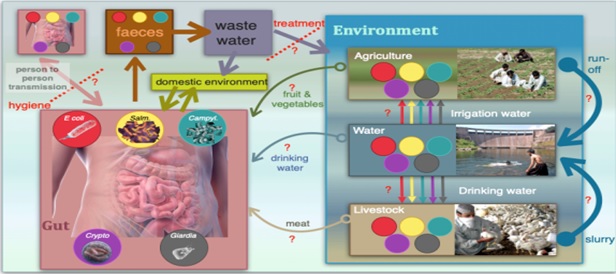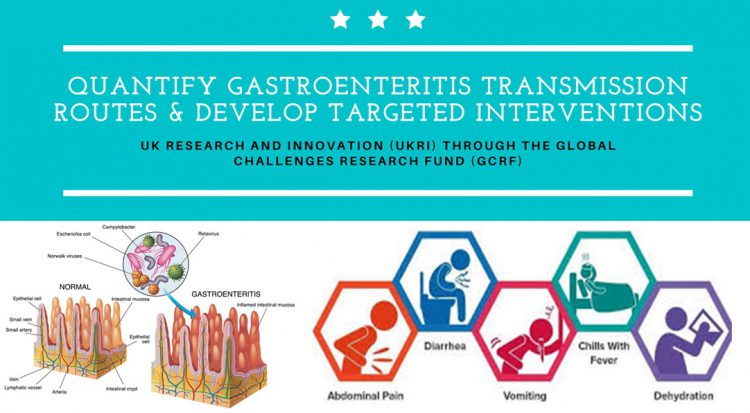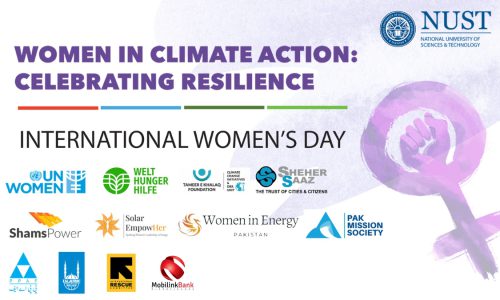The GastroPak Project worth £2 million funding in Pakistan by UK Research and Innovation (UKRI) through the Global Challenges Research Fund (GCRF), is a collaboration with partners in Pakistan, UK and Ireland. It is one of the 141 new international development research projects announced by UK Research & Innovation (UKRI) to generate innovative solutions to intractable development issues and contribute to enabling healthier and safer lives, sustainable development and prosperity for all. Collaborating partners of the project are Earlham Institute, National University of Sciences & Technology in Islamabad (NUST), University of Warwick, University of Agriculture Faisalabad, University of Galway, Institute of Developmental Sciences at the University of Southampton, and the Cranfield University. The group will also be working with local and national partners on the ground to meet anyone with a stake in clean water and food, good sanitation, and public health.
Gastroenteritis, most commonly termed as “stomach flu” is a condition in which stomach and intestines are irritated and inflamed. The symptoms of Gastroenteritis may include diarrhea and dehydration which results in deaths with high numbers. It can be easily complicated in areas of the world where clean water is in short supply. This contributes to stunting and cognitive impairment in children, particularly following bacterial and parasitic infection.
Gastroenteritis is a major drainer of public money in Pakistan and this project will attempt to mitigate that problem. Almost 60,000 people annually succumb to this avoidable adversity. Indeed, in Pakistan, 38% of children under five years old have fallen prey to it at some point in their lives. Diarrhea accounts for 10.8% of under-five mortality in Pakistan, making it a leading cause of death in this age group.
The focus of this research project will be to Quantify the rates of different non-viral gastroenteritis transmission routes in Pakistan. Moreover, it also relates the importance of different transmission mechanisms across our study areas in Pakistan to different social and behavioral contextual factors, such as sanitation, hygiene, diet. Project team will also determine how to generalize outcomes of this study to other low or middle income countries.
The project will help to build capacity in Pakistan to enable non-viral gastroenteritis pathogen diagnosis and surveillance to be applied in real time using novel, but portable and cost-effective, PCR protocols combined with frontier Nanopore DNA sequencing. Researchers will also test the feasibility of a simple intervention (around the water-wastewater cycle or behavioral) to mitigate transmission and reduce gastroenteritis rates in Pakistan. Moreover, GastroPak Project team will determine the effectiveness of alternative wastewater treatment technologies for gastroenteric pathogen removal contrasting relatively low-technology methods, such as managed wetlands, with higher-technology membrane bioreactors. The project also aims to determine the importance of different crops and irrigation strategies for pathogen loads and infection risks in a controlled setting.
In this project, the collective intellect of a team of social scientists, microbiologists, engineers, epidemiologists, chemists and statisticians will strive for a solution. An inter disciplinary effort will lead them towards better understanding of the various social, biological, chemical and technical factors affecting the spread of gastroenteritis through agriculture, sanitation, drinking water, food, and person-to-person contact. A significant effort will be made to understand the social attitudes to water, sanitation, hygiene and how those link to agriculture, food and the way communities live their lives.

Novel, low cost, reliable, innovative and marketable protocols will be developed that enable us to rapidly detect bacteria (Shigella, E. coli, Campylobacter, Salmonella including Typhi) and parasites (Cryptosporidium and Giardia) based on PCR amplification, and Nanopore sequencing, of targeted, hyper-variable, genomic regions. Among these, Campylobacter is particularly strongly associated with growth-stunting in children.
Generating genetic data from the survey samples and the trials, and from both isolates and mixed-species community meta genomes, will allow to perform source attribution. This will be a groundbreaking development for disease surveillance and prevention.
Uniquely, the results of the biological survey and importance of different transmission routes will be contextualized in the cultural politics of sanitation, and behavior change; gender, social and power relations in the community; trends in cooking, hygiene and agricultural practices; access to water and sanitation in rural and peri-urban areas; and socio-cultural determinants, such as poverty and inequality, and ethnic, religious and caste practices, as well as access to basic services. This will enable the qualitative analysis of key social drivers of public health dynamics and of the ‘faecal-oral’ context. This information will be combined with field sampling studies from agricultural production, and sanitation systems, to determine the impact of potential interventions on the distribution of pathogens. One intervention will be trialed in the final phase of the project; the exact choice and approach to implementation will be informed by the social science so as to be both effective and appropriate in the cultural and socio-technical context.
The project team believes, that if we can better understand the major risks, then we can help people to mitigate them. This knowledge can then be applied to other communities around the world. This exciting program brings together diverse expertise from across the globe, ensuring that the voices of those most impacted are empowered to drive sustainable solutions for those most in need.
GastroPak Project Pakistan will foster relationships between researchers and a variety of key stakeholders in the UK, Ireland and Pakistan that lead to long-term collaborative relationships, and the transfer of skills and individuals between the two countries. In addition to this, it will raise the awareness of individuals and communities in Pakistan of the risks associated with different sanitation, hygiene and cooking practices, and encourage individuals to alter their behavior to mitigate them.
The author is the Associate Dean at Institute of Environmental Sciences and Engineering and is also a Professor at NUST School of Civil and Environmental Engineering. He can be reached at [email protected]
Gastroenteritis Grant Pakistan, Gastroenteritis Grant NUST, Gastroenteritis Funding NUST, Gastroenteritis Funding Pakistan, UKRI Funding Pakistan, UKRI Grant Pakistan, GCRF Funding 2020, GCRF Funding Pakistan, GCRF Grant 2020, Gastropak, Gastropak NUST, Gastropak Funding Pakistan, Gastropak Grant Pakistan, Research Activities in Pakistan, NUST Research, Defining Futures





